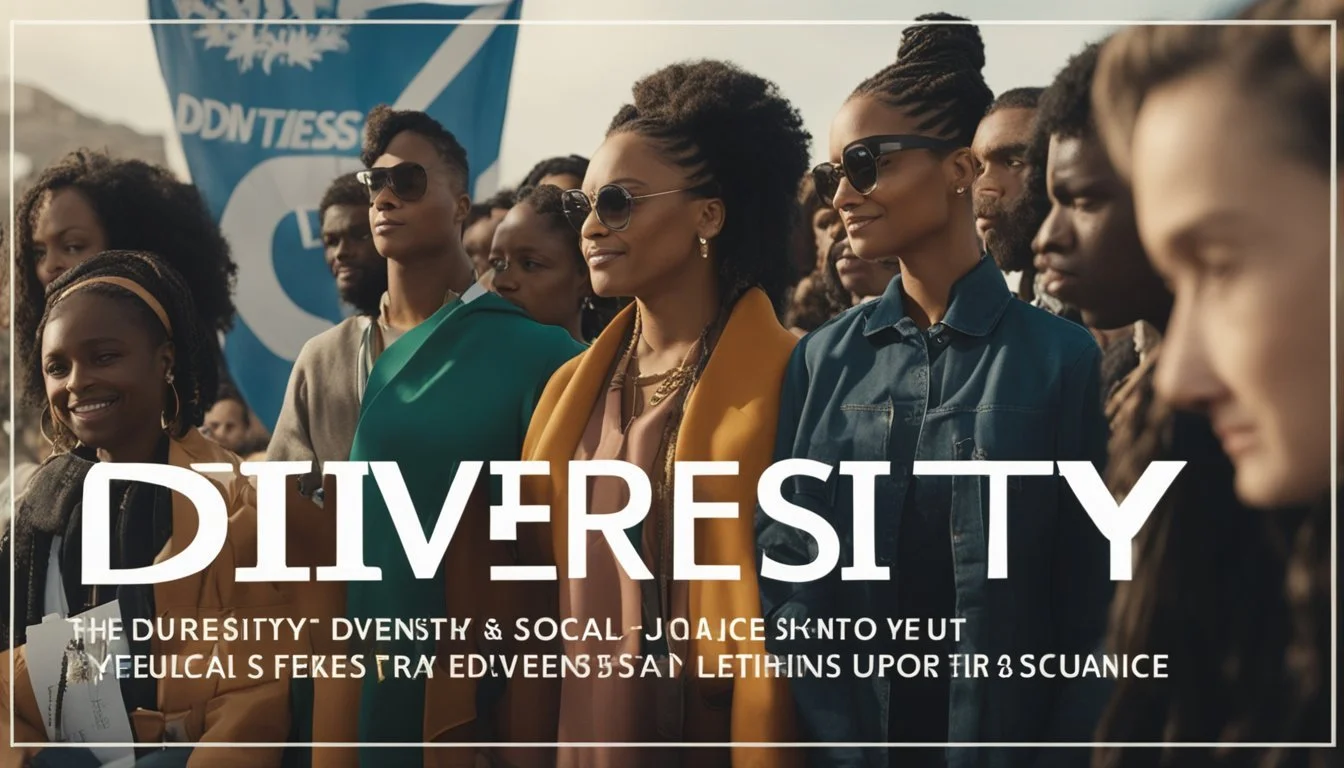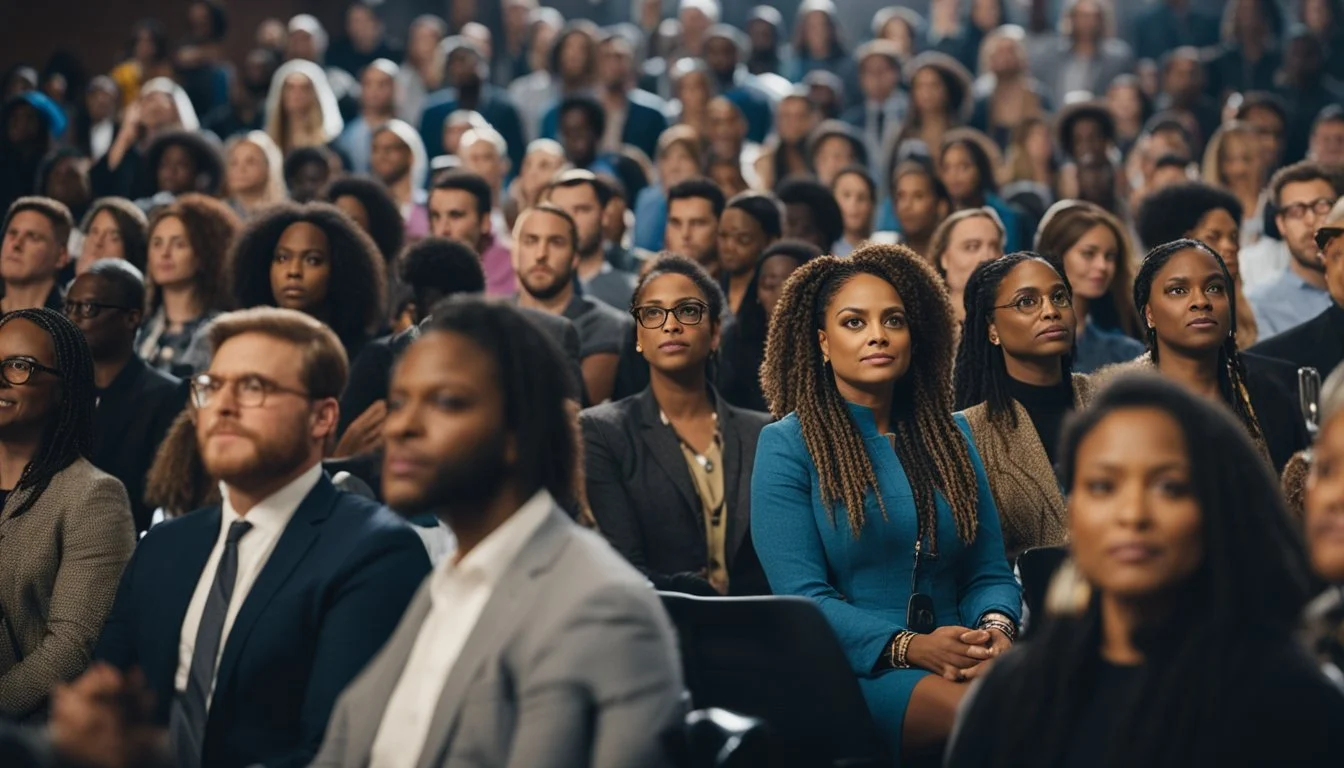Ava DuVernay: Championing Diversity and Social Justice in Film and Media
Ava DuVernay has cemented her place as a transformative figure in Hollywood, not just through her visionary filmmaking but also her unapologetic commitment to social justice and diversity. Her groundbreaking work provides a platform for underrepresented voices, particularly those of women and people of color, in an industry that has long sidelined them. From her acclaimed films like "Selma" and "13th" to her influential media company ARRAY, DuVernay is reshaping the narrative landscape.
Through ARRAY, DuVernay has expanded her impact, focusing on the distribution of films by minority and female creators. This initiative aims to change the way stories are told and who gets to tell them, providing greater representation and opportunities in film and media. Her efforts are not just confined to the screen but extend into real-world activism, as seen in the launch of the Law Enforcement Accountability Project, which addresses police violence and systemic inequality.
Collaborating with organizations like Color of Change and Participant, DuVernay’s work extends far beyond entertainment, pushing for tangible societal change. Her dual focus on artistic excellence and social activism sets her apart, making her a pivotal figure in both the film industry and the broader movement for equality and justice.
Early Life and Education of Ava DuVernay
Ava DuVernay was born on August 24, 1972, in Long Beach, California.
Raised by her mother, Darlene (née Sexton), an educator, and her stepfather, Murray Maye, Ava grew up in Lynwood, California. Her biological father, Joseph Marcel DuVernay III, has Louisiana Creole roots.
As a child, DuVernay's Aunt Denise played a significant role in nurturing her passion for art and creativity.
Her aunt, who worked as a nurse, encouraged Ava's interest in art, literature, and theater.
DuVernay attended Saint Joseph High School in Lakewood, California, where she excelled academically and showed a keen interest in storytelling.
She later attended the University of California, Los Angeles (UCLA), where she pursued dual degrees in English literature and African American studies.
At UCLA, her exposure to a rich cultural and academic environment solidified her drive towards a career in the arts.
Growing up with an entrepreneurial father who owned a carpeting business, Ava learned the importance of hard work and determination early on.
Career Beginnings in Film and Television
Ava DuVernay's career in film and television is marked by significant transitions and groundbreaking independent projects. Her journey from a successful career in publicity to becoming an influential director highlights her determination and visionary approach.
Transition from Publicity to Directing
Ava DuVernay initially carved her path in the entertainment industry as a publicist. Working on campaigns for films like Dreamgirls and The Terminal, she gained an insider's understanding of Hollywood operations. This exposure sparked her interest in storytelling from behind the camera.
By 2008, DuVernay directed her first short film, Saturday Night Life. The project revealed her talent and potential, propelling her to create the documentary This Is the Life, which debuted at several film festivals. This transition demonstrated her commitment to bringing untold stories to light and set the stage for her later successes.
Independent Filmmaking
DuVernay's foray into independent filmmaking emphasized authentic narratives, often spotlighting African American life. In 2010, she directed her first narrative feature film, I Will Follow.
Funded independently, the film tackled themes of loss and healing, receiving critical acclaim and winning awards at festivals. This venture solidified her resolve to remain true to her artistic vision.
Her next film, Middle of Nowhere (2012), garnered her the Sundance Film Festival's Best Director award. This achievement made her the first African American woman to win the honor. Middle of Nowhere explored complex emotional landscapes and underscored DuVernay's status as a formidable filmmaker committed to diversity and depth in storytelling.
Major Works and Critical Acclaim
Ava DuVernay’s filmography includes influential works that have garnered both critical acclaim and sparked important conversations about race, justice, and history. Each project showcases her dedication to telling compelling, socially relevant stories.
Selma
Author of the Civil Rights Movement, "Selma" (2014) focuses on Martin Luther King Jr.’s legendary 1965 march from Selma to Montgomery. The film explores the strategic and deeply human aspects of the movement, delivering a powerful narrative of courage and resilience. DuVernay’s direction earned her a Golden Globe nomination, and the film received an Oscar nomination for Best Picture. The portrayal of historical events is authentic and stirring, capturing the intense emotions and pivotal moments of this period.
13TH
"13TH" (2016) is a documentary that examines the intersection of race, justice, and mass incarceration in the United States. The title refers to the 13th Amendment, which abolished slavery but allowed for involuntary servitude as punishment for a crime. Through interviews with scholars, activists, and politicians, DuVernay traces the evolution of racial inequality from post-slavery America to the modern-day prison industrial complex. It was nominated for an Academy Award for Best Documentary Feature and won a Primetime Emmy Award for Outstanding Documentary or Nonfiction Special.
When They See Us
In "When They See Us" (2019), DuVernay transforms the story of the Central Park Five into a gripping, heart-wrenching miniseries. The series recounts the wrongful conviction of five Black and Latino teenagers in 1989. Through meticulous storytelling and character development, the series highlights the deep injustices in the criminal justice system. It received critical praise and numerous awards, including a Primetime Emmy for Outstanding Lead Actor in a Limited Series. DuVernay's approach to sensitive material shows her commitment to narrative accuracy and emotional truth.
Advocacy for Diversity in Hollywood
Ava DuVernay has made significant contributions to promoting diversity and inclusivity in Hollywood. She has founded key initiatives and platforms to support underrepresented voices and has consistently championed women directors.
Founding ARRAY
Ava DuVernay founded ARRAY in 2010. Initially known as the African-American Film Festival Releasing Movement (AFFRM), ARRAY aims to amplify the voices of filmmakers of color and women directors.
ARRAY is dedicated to distributing films that might not receive mainstream attention. It also supports an extensive network of creators through workshops, panels, and networking opportunities.
Films distributed by ARRAY include varied genres and narratives, focusing on stories that celebrate diverse cultures and experiences. This initiative is pivotal in changing Hollywood's landscape by ensuring more diverse, authentic stories reach audiences.
Promoting Women Directors
DuVernay is a strong advocate for increasing the number of women directors in Hollywood. Through her work and platforms like ARRAY, she provides mentorship and opportunities for emerging female filmmakers.
She has directed and produced work that highlights women's stories and experiences, drawing attention to gender disparities within the industry. Her directorial projects, such as "A Wrinkle in Time," feature strong female leads, emphasizing the importance of representation.
By actively hiring and promoting women directors, she sets a precedent for inclusive hiring practices. DuVernay's work underscores the necessity of gender equity, pushing Hollywood toward a future with more varied and meaningful storytelling.
Activism and Social Justice
Ava DuVernay has consistently used her platform to address pressing social issues. From racial equality to criminal justice reform, her commitment is evident in both her films and her off-screen initiatives.
Racial Equality
Ava DuVernay has been a vocal advocate for racial equality. Her film "Selma" highlighted the struggles during the civil rights movement, particularly focusing on the 1965 Selma to Montgomery marches.
Through ARRAY, her distribution company, she aims to amplify voices from underrepresented communities. The company's projects foster understanding and appreciation of different racial and cultural backgrounds. Additionally, DuVernay's collaboration with influential figures like Angela Davis helps bring important discussions about race to mainstream audiences.
Criminal Justice Reform
DuVernay has focused on criminal justice reform in various works. Her documentary "13th" explores the intersection of race and the American criminal justice system, pointing out the systemic racism ingrained in the prison industrial complex.
"When They See Us," her miniseries on Netflix, telling the harrowing wrongful convictions of the Central Park Five, brought significant public attention to issues of wrongful imprisonment and racial bias in the justice system. Moreover, her Law Enforcement Accountability Project seeks to hold police accountable for their actions, promoting transparency and justice.
Influence and Contributions
Ava DuVernay has reshaped Hollywood and brought critical social issues into the spotlight through her innovative filmmaking and advocacy. Her work has significantly impacted both culture and media and has earned her numerous awards and honors.
Impact on Culture and Media
Ava DuVernay's filmmaking often addresses pressing social justice issues. Her films, such as 13th and When They See Us, explore mass incarceration and racial injustice. These works not only entertain but challenge societal norms, sparking conversations about entrenched systemic issues. By centering her narratives on marginalized communities, she ensures that these important stories get the platform they deserve.
Through her distribution company, Array, DuVernay promotes films by women and people of color, broadening the scope of representation in Hollywood. This initiative has provided minority filmmakers with unprecedented opportunities, creating a more inclusive industry.
Awards and Honors
Ava DuVernay's groundbreaking work has garnered her numerous accolades. She made history as the first African American woman to win the Best Director Prize at the Sundance Film Festival for Middle of Nowhere. Her film 13th won an Emmy Award and an Academy Award nomination for Best Documentary Feature.
In 2018, she became the first African American woman to direct a film with a budget over $100 million, with A Wrinkle in Time. DuVernay's continuing recognition underscores her influence and the high regard in which her work is held.
Personal Philosophy and Public Speaking
Ava DuVernay's personal philosophy underscores her commitment to diversity and social justice in the film industry. She aims to provide a platform for underrepresented voices, particularly those of women and people of color.
DuVernay leverages public speaking to amplify her message. In talks, she often emphasizes the importance of inclusion and the systemic change required in Hollywood.
Her participation in events, such as TED Talks and academic conferences, showcases her ability to engage diverse audiences.
Example Topics in DuVernay's Speeches:
The imperative of diverse storytelling
Challenges facing minority filmmakers
Strategies for inclusive media production
Her speeches highlight the intersections of art and activism, illustrating how film can serve as a powerful tool for social change. Her ability to articulate these ideas lies at the core of her influence both on and off the screen.
In panels and interviews, DuVernay often discusses the influence of historical context on her work, drawing connections between past injustices and contemporary issues. This perspective is foundational to her storytelling approach and public engagements.
By melding personal philosophy with public discourse, she continues to inspire both upcoming and established filmmakers.
Future Projects and Endeavors
Ava DuVernay continues to push boundaries with her future projects. One of the most anticipated is a social impact film produced by her company Array. This project highlights narrative-shifting stories and continues her mission of promoting diversity in Hollywood.
Her upcoming film, Origin, boasts a $38 million budget. This innovative approach allows DuVernay to maintain full creative control, freeing her from traditional studio constraints.
DuVernay's influence extends beyond filmmaking. Through Array Alliance, she supports initiatives like the mentoring program #StartWith8Hollywood, fostering diversity within Hollywood's behind-the-scenes crews.
Her projects aim to diversify the industry, providing platforms for minority talents. With philanthropic financing models, she sets new standards for inclusive production.
List of Future Endeavors:
Social impact films
Origin (upcoming film)
Support for #StartWith8Hollywood
Continued expansion of Array
With these projects, Ava DuVernay redefines how stories are told and who gets to tell them.



